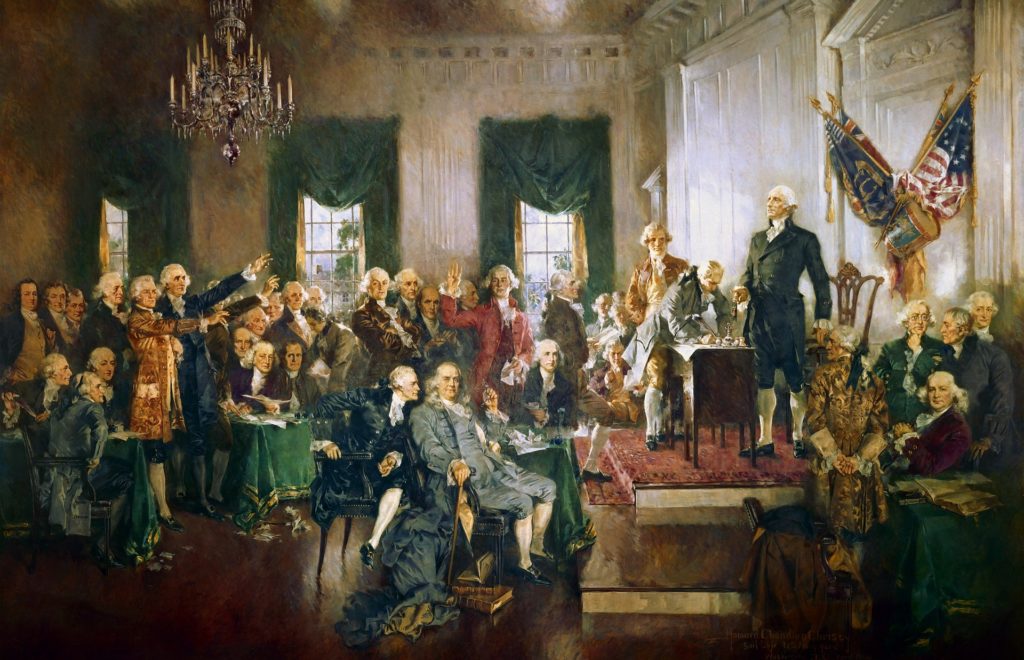In just a few weeks, I will mark three years as managing editor of Public Discourse. Many changes—most notably, getting married and having my first child—have taken place in my life during that time. What has remained the same is my conviction that it is an honor and a privilege to help run a publication that fills such a unique and essential role in today’s political and cultural debates.
Today, on the Fourth of July, we celebrate the founding of the United States of America. We celebrate because from its first moment this country committed itself to the defense of the rights to life, liberty, and the pursuit of happiness. We celebrate that this country was founded not on the arbitrary rule of men, but on the reasonable rule of law. We celebrate the founders of this country, who—despite their human failings—had the courage, vision, and hope to establish a society governed by true and lasting principles.
On the last day of the Constitutional Convention of 1787, as Benjamin Franklin left Independence Hall, a woman asked him, “Well, Doctor, what have we got—a Republic or a Monarchy?” Franklin famously replied, “A Republic—if you can keep it.”
In an election cycle that has given us a choice between Hillary Clinton and Donald Trump, in which crudity, vitriol, and prejudice vie for top billing, it may seem as if that republic is slipping through our grasp. Social media overflow with memes and videos that reduce complex issues to slogans that vilify those on one side of the political divide while making the other side feel smugly self-righteous in the obvious superiority of their position. Mainstream media are little better, aggressively embracing “neutral” ideals of secular progressivism that run counter to the deepest convictions of half the American people, causing them to feel (and sometimes truly to be) persecuted and alienated. Politicians in both major parties routinely cater to the lowest passions of their constituents, even if that means lying or dehumanizing the vulnerable, whether they be immigrants or the unborn.
Start your day with Public Discourse
Sign up and get our daily essays sent straight to your inbox.This is no way to seek truth or justice.
True political discourse requires thoughtfulness. It requires the prudence to distinguish between objective natural law—which can never be compromised—and practical problems to which there can be many acceptable solutions. It requires the charity to assume the sincerity and goodwill of others until they have proven themselves to be acting on other motives. It requires persistence, since discovering the most just solution to our complex political issues is difficult, and convincing others of the truth—once we have discovered it—can be even more so.
These virtues—thoughtfulness, prudence, charity, and persistence—are often missing from other sources of news and opinion. Here at Public Discourse, we strive to find authors who exhibit these virtues, and expose their work to a broader readership. In so doing, we also seek to cultivate these virtues in ourselves and in our readers.
You may have noticed that our articles are long—usually close to 2,000 words. They often require some serious effort from you, the reader. They take different forms, depending on their authors. Some of our authors, such as philosophers Christopher Tollefsen and William Carroll, are remarkable for their precise, careful distinctions and keen, detailed analysis. Others, like Katy Faust and Jean Lloyd, are more personal in their approach, telling us what it’s really like to live through culturally significant experiences, such as being raised by a gay parent or coming to terms with one’s own same-sex attraction.
Many of our articles focus on marriage and the family, since strong families form the core of a virtuous and thriving society. Personally, as I have become a mother, I have often recalled and reflected on the articles I have edited for Public Discourse. As I watch my husband play with our daughter, I can’t help thinking of Jenet Erickson’s analysis of the valuable differences between mothering and fathering. As I attempt to balance my work with the demands of motherhood, I think of Ana Samuel’s sage advice for managing this “thrilling tug of war.” And as I am tempted to despair for the future of our country, I remember Archbishop Chaput’s wise advice: when it comes to rebuilding our culture, changing diapers and loving my husband are just as important as electing principled statesmen and passing just laws.
Public Discourse is a forum like no other, because it brings together the academic expertise of scholars in a vast array of disciplines—politics, philosophy, sociology, psychology, medicine, literature, history, law, economics, and on and on—and makes their work accessible and relevant. Public Discourse is also unique because we publish first-person narratives about social issues, like transgenderism, that don’t conform to a script embraced by most media outlets. We give a platform to many whose voices might otherwise never be heard, but whose viewpoints are essential.
And we bring all of this content to you for free. There are no paywalls or subscriptions here. However, as I’m sure you can guess, this content is not free to produce. We are a lean operation, but website maintenance, a mass emailing program, honoraria for our authors, salaries for our editorial team—all of these costs add up.
This Fourth of July, if you believe that the work we do improves the political discourse that is so vital to the preservation of our republic, won’t you make a gift to support the work of Public Discourse?












